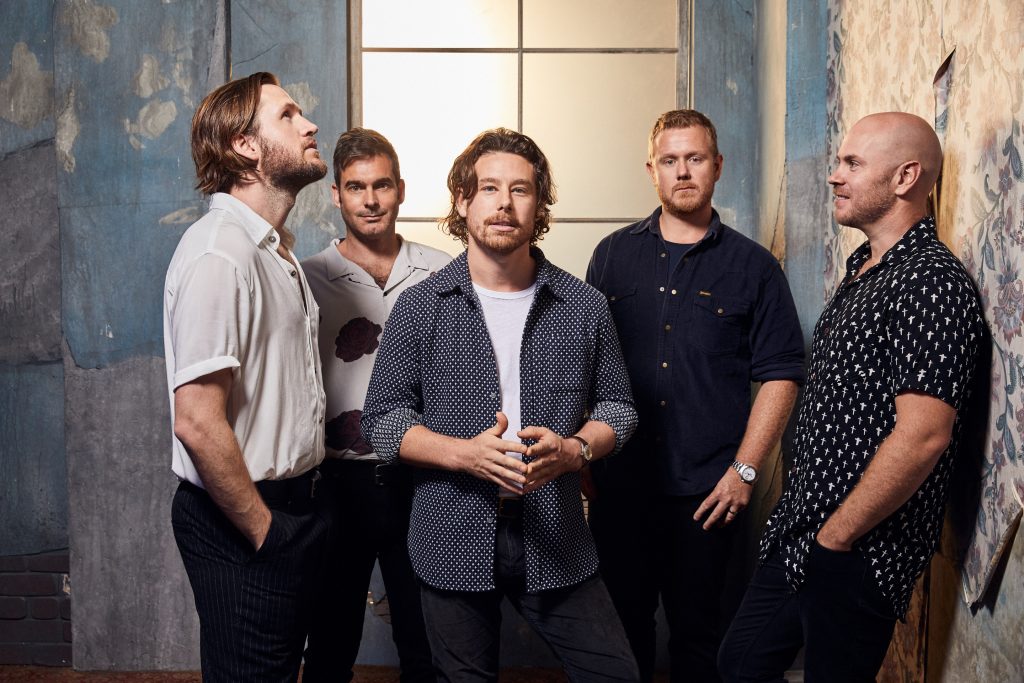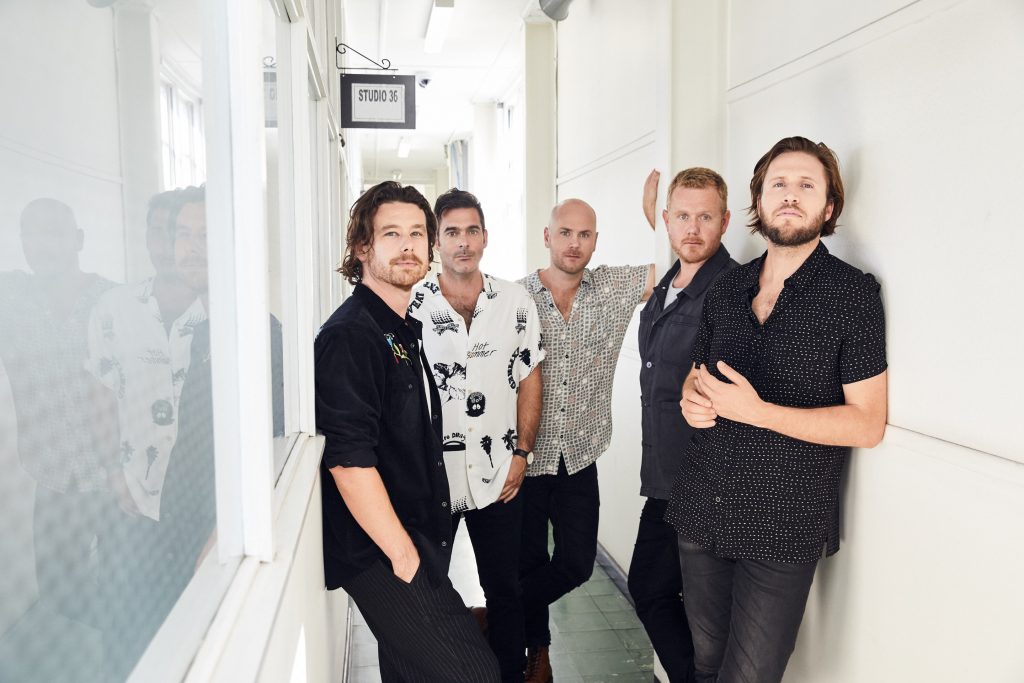Boy and Bear make anticipated return with ‘Suck on Light’
For any band, logistical coordination of its members poses a challenging test that separates most. Boy and Bear however, were tasked with the mountainous challenge of coming back to music after vocalist-guitarist Dave Hosking battled through a threatening illness that left him unable to capitalise on his craft the way he once could.
Despite the ailment hampering Hosking’s day-to-day life, and impacting Boy and Bear’s musicianship, the quintet never allowed their craft and legacy to perish. Now, Boy and Bear sift through their troubles to give us ‘Suck on Light’.
The statement record weaves moments of warmth and relief through the despondency that comes with uncontrollable circumstances. ‘Suck on Light’ bridges the space between being disrupted by fear and finding a haven in optimism. Their contemporary take on 70s tones and harmonies and lyrics ruminating on the hurdles of illness, all layered to encompass how pitfalls breed strength see Boy and Bear deliver their most unfaltering body of work, in spite of extreme uncertainty.
From rehearsals all the way in Pennsylvania, drummer and vocalist Tim Hart chats about the journey to Boy and Bear in 2019, and the meticulous construction of ‘Suck on Light’.

How does it feel to be back and refamiliarising yourself with such big spaces and the international environment?
It feels great. A lot of these times, we weren’t really sure if we were going to be able to do it. We’re really busy now, but you don’t complain about that. We’ve learnt to appreciate the opportunities we do have and keep moving forward.A
It must feel amazing, to be playing shows in the US and on release day.
It’s really exciting. This is our fourth album and it hasn’t felt this exciting [before]. This new air of anticipation. We feel like we get a chance again to do what we love and I’m so excited for people to hear it and to see what they think.
Your bandmate Killian Gavin once said, “we had demos for a year-and-a-half with no lyrics, just jargon, but you know a good melody when you hear it… It got exciting”.
Do you feel like you had to be a bit more patient with this album?
Yes, definitely. We could only really work when Dave was well enough. He’s been notoriously slow at lyrics. I write lyrics with him, and he always has left it to the last minute, before he was sick. This time, he had to find a new way of doing things.
We were demoing for about 18 months and then he started to write lyrics. The first day he started to write lyrics for the outro to a song called ‘BCS’ on the album. It was so exciting because he was stoked he was able to do it again. It was a slow process. He started then writing lyrics and sending them to me and we’d tweak them.
By the time we actually got to Nashville [to record], we had lyrics to about 13 or 14 songs, which is just unheard of for us. The sense in the lyrics, a lot of it is about Dave’s health, but there is a real hope in it. As I’m writing with him, it was nice to see a genuine hope in what he was writing. That reflects what we’re feeling.
When I listened to the album, what was so compelling was how the tracks were threaded. My two favourite songs were ‘Dry Eyes’ and ‘Telescope’ because they were straight after each other, but the juxtaposition of them was so clear.
Was that conscious to try and disperse the grimness with hope?
All the little finnicky stuff, we feel like nobody notices. I think we did about 50 different versions of the album sequence. We’re real album people. We want it to make sense, but thematically challenge people. It’s definitely what we set out to do. It has to be a journey. That’s what we wanted. It starts with ‘Work of Art’ and ends with ‘Vesuvius’, which is this hypnotic outro. If people aren’t over it by then, hopefully they can start it again. ‘Dry Eyes’ and ‘Telescope’ is the juxtaposition of desperation and hope. That sums up the theme of the album.
Further progression into the album sees the intricacies Tim mentions pile up. Track number ten, ‘Rocking Horse’ had a small tinge of loudness and aggression.
I found that attractive because when I was going through the album, it’s not something I expected to hear. That also personally increases the replay value, which you said was a big goal of yours.
When did the idea for ‘Rocking Horse’ and the decision to shape into something outlandish relative to the rest of the album become agreed upon?
It’s like cooking. Sometimes it’s just about different elements that make up a perfect recipe. The attitude in ‘Rocking Horse’ is strength. It’s weird with the monotonic vocal, but it’s very raw and emotive. That was such a cool one to play. The little intricacies of it that you hear on the third and fourth listen are the things we love as musicians.
We call it “hiding little bits of ear candy” in and amongst the record. The people that love music and go through the notes of the LP and try to figure out what’s going on, that’s what we love doing as listeners. So, when we make a record we want to do that. You want people to not just listen to a song and get over it… We strive to not make records like that. Hopefully we got there.
The quintet recruited the efforts of producer Collin Dupuis at Nashville’s Southern Ground studios in the making of ‘Suck on Light’.
What do you think being in Nashville and around Collin did to intensify your sounds and vision?
I think we could’ve been anywhere with Collin. The studio we were in had so many options. Anything you wanted to play, you could just play. He spent the first two days self-recording and said, “don’t bother coming”. He spent the first two days getting pretty much every microphone, keyboard and guitar set up…
It opened the doors to creativity. Sometimes you work with a producer and an engineer who says you have to do everything later, but he said, “let’s do it now. Whatever you’re feeling inspired by, let’s do it now”. Everything that’s in our crazy, musician minds, he was able to make it come out on the record… That was so cool to have. He would rather not use a sample off a computer and would rather figure out how to make that sound acoustically and effective.
The start of ‘Work of Art’ is all sounds we acoustically recorded in the studio and just messed with. He definitely pushed us because he gave us the ability to be creative. He had a sky’s the limit attitude to use whatever technology, whatever instruments we have available and go for it.
Do you think the spontaneous and do it sooner rather than later attitude makes it feel more genuine and gives off more of a real-time listening experience?
Yes. 100%. There is something that is intangible about authenticity. You can sense when it’s there. The fact that pretty much all of these songs were played live and then we built around them comes across. Those are the best albums.
In The Rolling Stones song, ‘Gimme Shelter’, you can hear the backing vocals girl voice crack at one point. You can hear the guys in the control room yell. It’s almost like you’re back in the room with them. They understood the life in music. So many bands these days would be like, “we’ve got to do that again, and then autotune it”. We’re big music nerds, so we try to go for that stuff. You can’t create it, but be spontaneous and if you get something cool, keep it and don’t be so worried about perfection.
It’s definitely more enjoyable to listen and just sing along to when those flaws, and fortunate accidents come along.
100%. They are flaws! If you sing out of tune, the spirit of the take was right, so we keep it. Those are the things you go back to and listen to over and over again… It’s just this humanity. When you have pop music, there’s no life to it. It may sound good to people on the radio, but there’s no life to it.
Does going through these challenges as a group and Dave going through the illness as an individual gives you more of an openness to keeping the imperfections?
I think so. When one of your mates’ health is in a bad way, and over time he gradually starts to improve it gives you great perspective on what’s actually important in life. One of those things is music. It’s healing and super powerful. Being able to translate your humanity through music makes me feel like it’s almost wrong to be inauthentic. I love reading and I know people write fiction, but as long as there’s still some authenticity that comes through.

There’s a lot of mention of the cosmos and universe in your writing. Can you talk about why it’s so prevalent and why it’s easier to capture feelings that way?
There’s a fair few of us in the band that are quite spiritual people. I’m a Christian, but where we overlap is believe in the power of nature. Dave’s imagery when it comes to the universe and the cosmos, is because I think there’s a sense of great power in the universe when you’re hurting and desperate.
It’s an intangible thing, and how do you capture that and put it in the music? Dave’s always had a way when he writes lyrics and creates stories. There’s a great Japanese writer called Haruki Murakami and he manages to keep one foot in real world and the other in fantasy land. He does it so seamlessly, that you almost don’t know what world you’re in. That’s the way Dave describes the universe.
‘Long Long Way’ is one of those songs where you don’t quite know where you are, but you feel like you’re floating in space. Because of Collin understanding the notion of what we were trying to do, the sound is so spacey and wide. You feel like there’s a lot of room, and it’s a very cool thing.
Lastly, do challenging circumstances make for a better body of work?
Without a doubt. Nobody wants to go through tough periods of life. But, without tragedy, for lack of a better word, it’s really hard to produce great work. Maybe that’s part of why as artists get older, especially in music they tend to write less creatively. That’s not necessarily the truth when it comes to authors and painters. When people are more settled, maybe there’s not the need for the outlet. I like to think there are exceptions with Paul Simon, Peter Gabriel and Bowie, where you try to continually reinvest yourself and push the boundaries.
When we were talking to our managers and Dave said [he’s] happy to tell the story with [his] health even though it’s a full-on thing, they said, “if you went through hell, you may as well tell the story”. It was a horrible thing to go through, but I think it’s going to help a lot of people to get hope from the music. There’s also been people in touch with us telling us because of Dave’s story, they’ve found solutions to their health problems. That’s amazing.
Sometimes as musicians we’re selfish and very focused on writing these little songs in our bedrooms and playing them to people and wanting to be loved. You realise there’s more going on when people get in touch and explain how a certain song has helped them through something. I feel privileged to be a part of it.